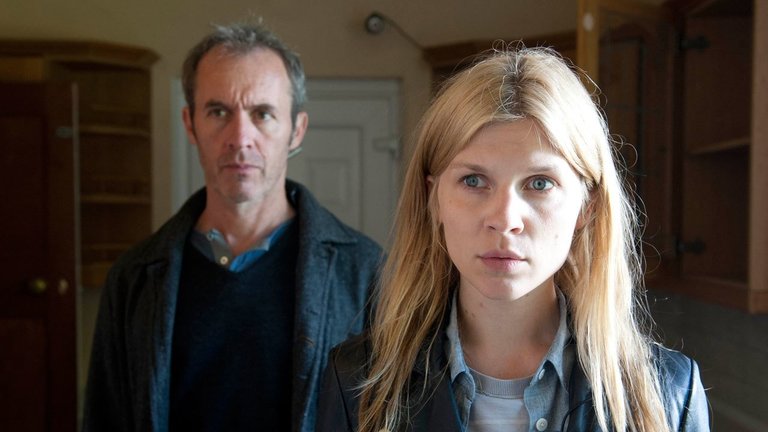Television Review: The Tunnel (Season 1, 2013)

Over recent years, audiences—whether literary or television-based—have had numerous opportunities to discover the talents of Danish, Norwegian, and Swedish crime writers, resulting in many authors from these countries achieving fame previously unimaginable. Local television studios quickly recognised this trend, producing a string of exceptionally popular TV series capable of standing shoulder to shoulder with the most polished crime dramas from the BBC and American networks. One of the most successful examples of this phenomenon, now widely known as Nordic noir, is The Bridge, the 2011 Swedish-Danish series. The story of a police detective duo forced to solve a bizarre and morbid murder case on the Øresund Bridge, which spans the sea between Denmark and Sweden, gained immense popularity, with the eccentric Swedish detective Saga Norén becoming one of the most striking television characters in recent memory. Given all this, it was inevitable that The Bridge would spawn several remakes—American, Russian, and British-French.
The British-French version differs from its original primarily in setting the action not on a bridge but in a tunnel—one equally impressive as a modern engineering marvel, fulfilling centuries-old dreams only once technological progress aligned with specific political circumstances. The Channel Tunnel, linking Britain with France and the rest of the European continent, becomes the scene of a horrific crime after the torso of a French anti-immigration politician is discovered precisely at its midpoint, severed cleanly in half. The investigation is jointly launched by Elise Wasserman (Clémence Poésy), a captain in the French Criminal Police, and British Inspector Karl Roebuck (Stephen Dillane). Though jurisdictional disputes are resolved in a Solomonic manner, the inquiry is complicated by stark contrasts in temperament—Roebuck is significantly older, more experienced, and politically astute, while Wasserman, though younger and physically striking, suffers from a serious personality disorder manifesting as social ineptitude, her only salvation being exceptional intelligence and a detective’s talent evident even to her superiors. Over time, Wasserman and Roebuck develop mutual respect and trust, which proves crucial as the case turns out far more serious than it initially appeared. The second half of the bisected corpse belongs to a British prostitute, and this spectacular crime is merely the first in a series growing ever more brutal and ruthless. The mysterious perpetrator, possessing extraordinary technical expertise, begins communicating with the public via a slimy British journalist, Danny Hiller (Tom Hiller), and the internet, claiming his murders aim to expose society’s hypocritical treatment of the elderly, children, and immigrants. The investigation, which uncovers uncomfortable intricacies tied to shady dealings among European elites, politicians, and intelligence agencies, gradually points toward a far more personal motive.
The first season, comprising ten episodes, largely adopts its plot from the Swedish-Danish original but adds a distinct dose of political engagement from the left hemisphere, as anticipated. Roebuck and Wasserman must contend not only with a warped yet highly intelligent and dangerous killer but also with the fallout of the global economic crisis, which has created a volatile mix of poverty, crime, and resentment on both sides of the English Channel. Meanwhile, the grand project of European unity reveals its dark underbelly: corrupt eurocrats, arrogant tycoons, and shadowy paramilitary groups tasked with preserving a shaky order. Against the backdrop of subsequent events—political upheavals once deemed unimaginable and now interpreted as consequences of these very trends—the first season of The Tunnel takes on an exceptionally bleak tone. Like many examples of Nordic noir, the series unsettles viewers with its willingness to brutally dispatch characters presumed to survive until the final episode, alongside scenes depicting torture and violence, including child victims.
Though the diverse cast delivers committed performances, Poésy’s exotic presence shines in the complex role of a woman who must simultaneously excel as a brilliant detective and embody the grace of an elephant in a china shop. Dillane, renowned as Stannis Baratheon in Game of Thrones, is equally compelling as a seemingly macho yet emotionally vulnerable officer who, unlike his partner, navigates relationships with the opposite sex but carries a string of failed marriages and a less-than-functional family life. Yet even outstanding acting only partially compensates for scripting flaws, including underdeveloped characters and subplots, alongside clichés that viewers unfamiliar with Bridge adaptations would spot from a mile away. The killer’s identity is telegraphed early on the moment a character actor specialised in villainous roles appears seemingly by chance, while the ostensibly emotional finale bears too much resemblance to the conclusion of Fincher’s Se7en. Nevertheless, the ending forms a cohesive whole, suggesting that the next two seasons—where the creators might deviate further from the Nordic template—could prove more original and finally bring new light at the end of The Tunnel.
RATING: 6/10 (++)
(Note: The text in the original Croatian version was posted here.)
Blog in Croatian https://draxblog.com
Blog in English https://draxreview.wordpress.com/
InLeo blog https://inleo.io/@drax.leo
LeoDex: https://leodex.io/?ref=drax
Hiveonboard: https://hiveonboard.com?ref=drax
InLeo: https://inleo.io/signup?referral=drax.leo
Rising Star game: https://www.risingstargame.com?referrer=drax
1Inch: https://1inch.exchange/#/r/0x83823d8CCB74F828148258BB4457642124b1328e
BTC donations: 1EWxiMiP6iiG9rger3NuUSd6HByaxQWafG
ETH donations: 0xB305F144323b99e6f8b1d66f5D7DE78B498C32A7
BCH donations: qpvxw0jax79lhmvlgcldkzpqanf03r9cjv8y6gtmk9